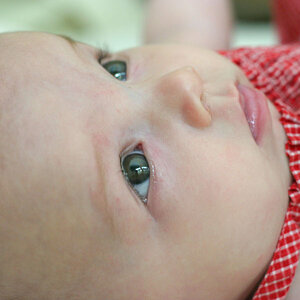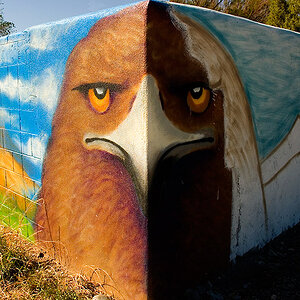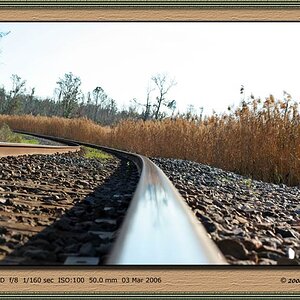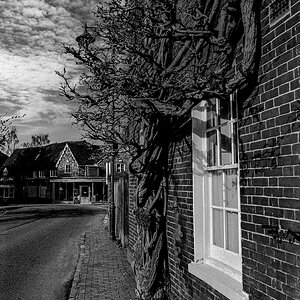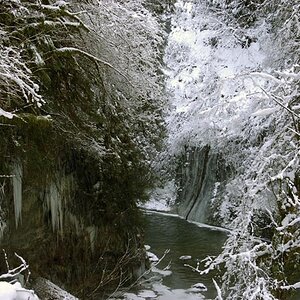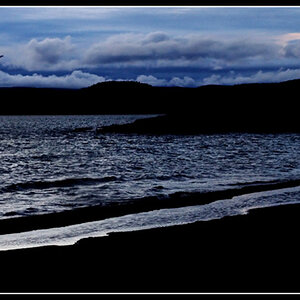Gavjenks
TPF Noob!
- Joined
- May 9, 2013
- Messages
- 2,976
- Reaction score
- 588
- Location
- Iowa City, IA
- Can others edit my Photos
- Photos OK to edit
In every single thread I've seen discussing this, over half the people seem to have unfounded fears about breaking the law when they shouldn't be. So here is a quick rundown for you (I am not a lawyer, but it's not really very complicated).
Main rule: If, as a member of the regular public walking around in places where the regular public is allowed to walk, you can see something with your eyeballs, then you are allowed to photograph it, including seeing privately owned land where you are not invited, as long as you can see it from somewhere you are. Unless it falls under one of the following exceptions:
Exception 1) If the subject of your photograph is a sensitive government site in terms of "national security." This would not include any privately owned buildings. It also would not include any government buildings in plain sight of two dozen people on the sidewalk right next to you (like a courthouse). It's more like isolated research facilities, Area 51, military bases, etc. If it's a government building, and you feel like there's a pretty good reason why you maybe wouldn't be wanted to take photos of it, ask.
Exception 2) If the subject of your photo is a person who is in a situation where they have a reasonable expectation of privacy. As in, a situation where a sane, normal, rational person would expect member of the public around them to not be able to see them or something they are doing OR has made some reasonable effort to isolate themselves. Examples: entering a PIN number on an ATM, even if it is in public; huddling over something in a way so as to intentionally block sight from nearby people (like a prescription bottle); sitting in a bathroom stall or a urinal divider; being in your house with curtains drawn (but with a 1 inch crack in them); etc. This does not include: sitting on your porch, or in a restaurant where the public is invited freely to walk in. This does not include: Merely not WANTING somebody to photograph you, if you have not bothered to even try to isolate yourself from the eyes of the public.
Exception 3) Places that you might technically have a line of sight to, but which you would never be able to actually usefully see without a highly telescopic lens, for example. You wouldn't be allowed to go up on top of a public parking garage and then use a 1000mm lens to photograph somebody tanning in their fenced in back yard 6 blocks away, if there's no other closer vantage point where somebody in the public could see them. (You CAN take photos of people from a parking garage 6 blocks away if somebody right next to them could see them normally, though)
Exception 4???) Possibly an airplane in flight, since there is no physical way for you to leave the premises in order to avoid trespassing, there is some vague precedent that you sort of have to do what the flight staff tell you, within reason. Gray area, but no reason to risk it, unless you like long, ambiguous, drawn out court cases.
Exception 5) if there is a clearly posted no photography sign, then its still not illegal per se to photograph and the business owner still cannot confiscate photos. However you may risk the possibility of trespassing charges being brought against you immediately after being caught. As in you may not have the option to avoid charges in this case merely by leaving if asked because effectively you WERE already asked and ignored it. Note that you COULD photograph a "no photography" area if you are not actually on their property where the sign refers to. For example, if a restaurant has a sign up saying "no photography," but they have an outdoor eating area with no fence around it to block you, you could still stand on the public sidewalk outside and photograph diners.
Examples of things you might not think you can do, but can:
* Photographing children playing in a playground, even a private one if you do so from a public sidewalk and there's only a chain link fence or something in between. This is sketchy and people will yell at you and you would be unwise, but it is legal.
* Photographing disaster scenes, car crashes, etc., including mangled bodies or whatnot, as long as you don't get in the way of emergency personnel doing their job, or cross any police lines that have been set up. Ethical? Maybe maybe not. But legal.
* Photographing police detaining people, etc., again as long as you don't hinder them.
* National parks
What happens if somebody confronts you?
1) A random member of the public: Nothing. You can hold the camera right in their face as they scream at you to stop, and as long as they are still standing there in full view of publicly accessible places, no law stops you from continuing to snap away. Obnoxious and maybe unethical? Sure. Might get you punched in the face (or stabbed)? Sure. But not illegal.
2) A business representative in a privately owned (but open to the general public) business: They cannot legally make you stop taking photographs. They CAN legally make you leave their property. If they tell you to leave, you have to leave, or you can be charged with trespassing. But even as you are walking out of the building after being kicked out, there's no law stopping you from holding down your shutter and continuing snapping photos, because the photography isn't illegal, only the potential trespassing if you don't walk out. And you never ever have to give up your camera or memory card to a business representative. If they take it anyway, you can press charges for theft.
2.5) Places like libraries function like businesses. I.e., if you are invited in, you can take photos by default, but a librarian could still ask you to leave, etc. just as if it were a restaurant, and you have to do so (even though it's a publicly owned building).
3) A police officer: If they tell you to stop photographing, you have to do so. You do not, however, have to give up your camera or your memory card, OR show them any of your images (that is a search), unless they have a warrant/court order. Do not physically resist them if they decide to do so anyway, of course (press charges after the fact instead), but you do not have to voluntarily give up any of these things, and if they merely ask you to, you can refuse (do so politely: "I do not consent to a search, sir").
if anybody other than a police officer tries to detain you, you can just start walking away calmly. If they physically detain you, that is assault.
Concluding disclaimers:
1) All of the above is simply when you can TAKE pictures. What you can DO with them is much much more complicated in terms of publishing and especially selling in various situations. Do not assume by default that just because you can take a picture, that you can either publish it or sell it.
2) Even if it is legal to take a photo, it may not be ethical.
3) Even if it is legal to stand up for your rights, it may not always be wise. Just because a person cannot legally detain you or stop you from photographing, doesn't mean they CARE. You can still end up with a broken jaw and a broken camera if you piss the wrong person off, even in the middle of a nice neighborhood in broad daylight. Sure you can press charges against them later, but that won't make your jaw less broken, and may not pay for your camera. And if you go angering people (especially ones who may be unstable/drunk/without anything to lose) with your photography on the worst side of Detroit, or in an empty alleyway almost anywhere, or while playing in an underground poker game, then you could well be taking your life in your hands. Just because you are legally in the right, and just because somebody stabbing you is wrong and breaking the law, doesn't mean you can't get stabbed.... and you don't want to get stabbed. It's bad for you.
The law is not a replacement for basic common sense.
4) Again, I'm not a lawyer. These guys are though, and this book is great: Legal Handbook for Photographers: The Rights and Liabilities of Making Images (Legal Handbook for Photographers: The Rights & Liabilities of): Bert P. Krages Esq.: 9781608954759: Amazon.com: Books Even then, though, people cannot dispense custom-tailored legal advice through a book. If you want to be absolutely sure of your rights for a given situation, consult with a lawyer for your particular situation.
Main rule: If, as a member of the regular public walking around in places where the regular public is allowed to walk, you can see something with your eyeballs, then you are allowed to photograph it, including seeing privately owned land where you are not invited, as long as you can see it from somewhere you are. Unless it falls under one of the following exceptions:
Exception 1) If the subject of your photograph is a sensitive government site in terms of "national security." This would not include any privately owned buildings. It also would not include any government buildings in plain sight of two dozen people on the sidewalk right next to you (like a courthouse). It's more like isolated research facilities, Area 51, military bases, etc. If it's a government building, and you feel like there's a pretty good reason why you maybe wouldn't be wanted to take photos of it, ask.
Exception 2) If the subject of your photo is a person who is in a situation where they have a reasonable expectation of privacy. As in, a situation where a sane, normal, rational person would expect member of the public around them to not be able to see them or something they are doing OR has made some reasonable effort to isolate themselves. Examples: entering a PIN number on an ATM, even if it is in public; huddling over something in a way so as to intentionally block sight from nearby people (like a prescription bottle); sitting in a bathroom stall or a urinal divider; being in your house with curtains drawn (but with a 1 inch crack in them); etc. This does not include: sitting on your porch, or in a restaurant where the public is invited freely to walk in. This does not include: Merely not WANTING somebody to photograph you, if you have not bothered to even try to isolate yourself from the eyes of the public.
Exception 3) Places that you might technically have a line of sight to, but which you would never be able to actually usefully see without a highly telescopic lens, for example. You wouldn't be allowed to go up on top of a public parking garage and then use a 1000mm lens to photograph somebody tanning in their fenced in back yard 6 blocks away, if there's no other closer vantage point where somebody in the public could see them. (You CAN take photos of people from a parking garage 6 blocks away if somebody right next to them could see them normally, though)
Exception 4???) Possibly an airplane in flight, since there is no physical way for you to leave the premises in order to avoid trespassing, there is some vague precedent that you sort of have to do what the flight staff tell you, within reason. Gray area, but no reason to risk it, unless you like long, ambiguous, drawn out court cases.
Exception 5) if there is a clearly posted no photography sign, then its still not illegal per se to photograph and the business owner still cannot confiscate photos. However you may risk the possibility of trespassing charges being brought against you immediately after being caught. As in you may not have the option to avoid charges in this case merely by leaving if asked because effectively you WERE already asked and ignored it. Note that you COULD photograph a "no photography" area if you are not actually on their property where the sign refers to. For example, if a restaurant has a sign up saying "no photography," but they have an outdoor eating area with no fence around it to block you, you could still stand on the public sidewalk outside and photograph diners.
Examples of things you might not think you can do, but can:
* Photographing children playing in a playground, even a private one if you do so from a public sidewalk and there's only a chain link fence or something in between. This is sketchy and people will yell at you and you would be unwise, but it is legal.
* Photographing disaster scenes, car crashes, etc., including mangled bodies or whatnot, as long as you don't get in the way of emergency personnel doing their job, or cross any police lines that have been set up. Ethical? Maybe maybe not. But legal.
* Photographing police detaining people, etc., again as long as you don't hinder them.
* National parks
What happens if somebody confronts you?
1) A random member of the public: Nothing. You can hold the camera right in their face as they scream at you to stop, and as long as they are still standing there in full view of publicly accessible places, no law stops you from continuing to snap away. Obnoxious and maybe unethical? Sure. Might get you punched in the face (or stabbed)? Sure. But not illegal.
2) A business representative in a privately owned (but open to the general public) business: They cannot legally make you stop taking photographs. They CAN legally make you leave their property. If they tell you to leave, you have to leave, or you can be charged with trespassing. But even as you are walking out of the building after being kicked out, there's no law stopping you from holding down your shutter and continuing snapping photos, because the photography isn't illegal, only the potential trespassing if you don't walk out. And you never ever have to give up your camera or memory card to a business representative. If they take it anyway, you can press charges for theft.
2.5) Places like libraries function like businesses. I.e., if you are invited in, you can take photos by default, but a librarian could still ask you to leave, etc. just as if it were a restaurant, and you have to do so (even though it's a publicly owned building).
3) A police officer: If they tell you to stop photographing, you have to do so. You do not, however, have to give up your camera or your memory card, OR show them any of your images (that is a search), unless they have a warrant/court order. Do not physically resist them if they decide to do so anyway, of course (press charges after the fact instead), but you do not have to voluntarily give up any of these things, and if they merely ask you to, you can refuse (do so politely: "I do not consent to a search, sir").
if anybody other than a police officer tries to detain you, you can just start walking away calmly. If they physically detain you, that is assault.
Concluding disclaimers:
1) All of the above is simply when you can TAKE pictures. What you can DO with them is much much more complicated in terms of publishing and especially selling in various situations. Do not assume by default that just because you can take a picture, that you can either publish it or sell it.
2) Even if it is legal to take a photo, it may not be ethical.
3) Even if it is legal to stand up for your rights, it may not always be wise. Just because a person cannot legally detain you or stop you from photographing, doesn't mean they CARE. You can still end up with a broken jaw and a broken camera if you piss the wrong person off, even in the middle of a nice neighborhood in broad daylight. Sure you can press charges against them later, but that won't make your jaw less broken, and may not pay for your camera. And if you go angering people (especially ones who may be unstable/drunk/without anything to lose) with your photography on the worst side of Detroit, or in an empty alleyway almost anywhere, or while playing in an underground poker game, then you could well be taking your life in your hands. Just because you are legally in the right, and just because somebody stabbing you is wrong and breaking the law, doesn't mean you can't get stabbed.... and you don't want to get stabbed. It's bad for you.
The law is not a replacement for basic common sense.
4) Again, I'm not a lawyer. These guys are though, and this book is great: Legal Handbook for Photographers: The Rights and Liabilities of Making Images (Legal Handbook for Photographers: The Rights & Liabilities of): Bert P. Krages Esq.: 9781608954759: Amazon.com: Books Even then, though, people cannot dispense custom-tailored legal advice through a book. If you want to be absolutely sure of your rights for a given situation, consult with a lawyer for your particular situation.
Last edited:

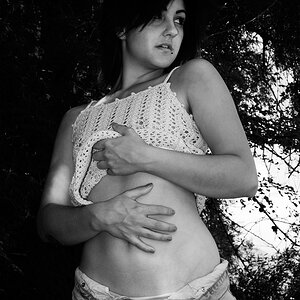

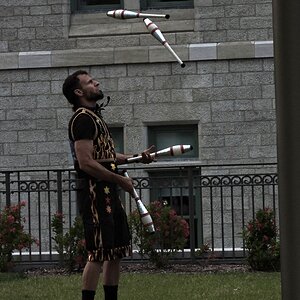
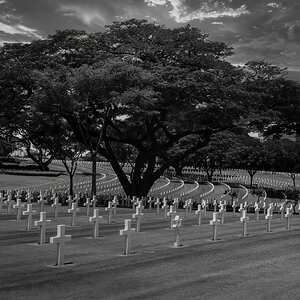
![[No title]](/data/xfmg/thumbnail/41/41786-0de67cacf7270937b4833f67d003f9c2.jpg?1619739891)

